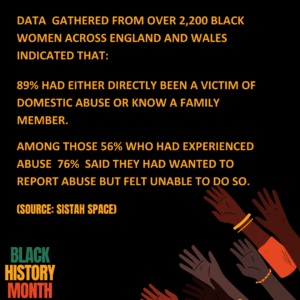Black History Month 2025 – Domestic abuse and supporting Black communities
Black History Month (BHM) is observed in the UK every October, serving as a time to celebrate the contributions of black communities while also raising awareness about issues that disproportionately affect them.
In recent years, there has been an increasing recognition of how domestic abuse impacts Black communities. Domestic abuse can affect anyone, but for black women and men, the experience can be compounded by systemic racism and cultural barriers.
This briefing aims to support practitioners in understanding and addressing the unique experiences of Black communities affected by domestic abuse.
The latest research
This Sistah Space Report (2025) examines domestic abuse experiences among Black women of African and Caribbean heritage in England and Wales through surveys (2,200+ participants) and interviews.
Key Findings:
- Eighty-nine (89%) had either directly been a victim of domestic abuse or know a family member.
Among those who had experienced abuse (56%):
- 78% shared that they had experienced domestic abuse on more than one occasion or during more than one period of time.
- 76% of survivors said they had wanted to report abuse but felt unable to do so.
- 87% of Black women did not feel that statutory services were supportive enough when they reported their abuse.
- 97% stated they did not feel confident that reporting abuse would result in fair or supportive treatment from services such as the police or social care.
Professionals working in the domestic abuse sector should ensure that Black victims, survivors, and perpetrators are supported in ways that are culturally competent, trauma-informed, and anti-racist.
Why this matters
Research and lived experience tell us that Black victims of domestic abuse:
- Are less likely to report abuse or access mainstream services. Cultural stigma surrounding domestic abuse can deter victims from seeking help or reporting incidents. There may be a reluctance to involve authorities due to fears of racial discrimination, stereotyping or a belief that family matters should remain private.
- Often experience multiple disadvantages, including immigration issues, housing insecurity, and mistrust of statutory services.
- May turn first to community or faith leaders rather than professionals. In many Black communities, research suggests that it is more likely for Black victims to seek informal sources of support before turning to the police or services.
Cultural factors influencing domestic abuse reporting
In some close-knit communities, there is also a strong notion of protecting the community and cultural integrity by not disclosing the abuse and this pressure can come from the community or the individuals. This cultural context can lead to underreporting and a lack of visibility for those experiencing domestic abuse.
Further insight with regards to barriers Black women face when they seek help can be discovered in the Imkaan and Centre for Women’s Justice report Life or Death (2023), which looks at the deaths of Black and minoritised women due to domestic abuse.
Black perpetrators may also face complex cultural and systemic challenges, but may be excluded from culturally responsive intervention programmes, which limits opportunities for behaviour change and accountability.
Key guidance for professionals
Challenge assumptions and bias
Recognise that domestic abuse occurs in all communities, but may look different or be reported differently in Black families. Be aware of your own unconscious bias and ask:
- Are you making assumptions based on someone’s ethnicity, accent, or faith?
- Are you responding differently to disclosures from black women or men?
Ensure your practice is culturally competent
- Use professional interpreters, don’t rely on children, partners, or community members.
- Learn about cultural norms that may impact how abuse is experienced or disclosed, without allowing culture to excuse abuse.
- Avoid stereotyping. For example, don’t assume Black women are “strong enough” to handle abuse or that Black men are automatically perpetrators.
Understand barriers to accessing help
- Fear of racism, deportation, or child removal often prevents Black survivors from seeking help.
- Some victims fear reinforcing negative stereotypes about their community.
- Black LGBTQ+ survivors face even greater isolation.
A diverse workforce
A diverse workforce is beneficial in delivering effective domestic abuse services that reflect the communities we serve. Domestic abuse affects people in different ways, and having a team with varied backgrounds and lived experiences strengthens the ability to understand risk and respond. When those working in the sector reflect the people they support, it helps build trust, improve engagement, and can help in ensuring that responses are culturally sensitive and inclusive.
Reflection questions for teams
Use these prompts during Black History Month to guide team discussions:
- Do we know which local services offer culturally specific support?
- How confident are we in identifying the unique risks black victims may face?
- How diverse is our team — and what are we doing to improve representation and inclusion?
- What have we done in the last 12 months to improve anti-racist practice?
Further Resources
Local Support
If you or someone you know is experiencing domestic abuse it’s important to know that you are not alone and there are people ready to help, our services are for everyone regardless of age, social background, gender, religion, sexuality or ethnicity. Compass is the domestic abuse line for Essex, and you can call them on 0330 333 7 444 or visit their website.
If you are in immediate danger, always call 999.
For anyone using harmful behaviour that would like help to change support is available here.
Specialist Support
There are organisations that provide support specifically for black women:
- Imkaan: A UK-based women’s organization dedicated to addressing violence against Black and minority ethnic women and girls.
- Sistah Space: A charity supporting African and Caribbean heritage women affected by domestic or sexual abuse.
- Southall Black Sisters offer specialist support, advocacy, and information to Asian and Afro-Caribbean women suffering abuse
- Galop national LGBTQ+ anti-abuse charity, offers helpline, advocacy, and support for LGBTQ+ survivors.


